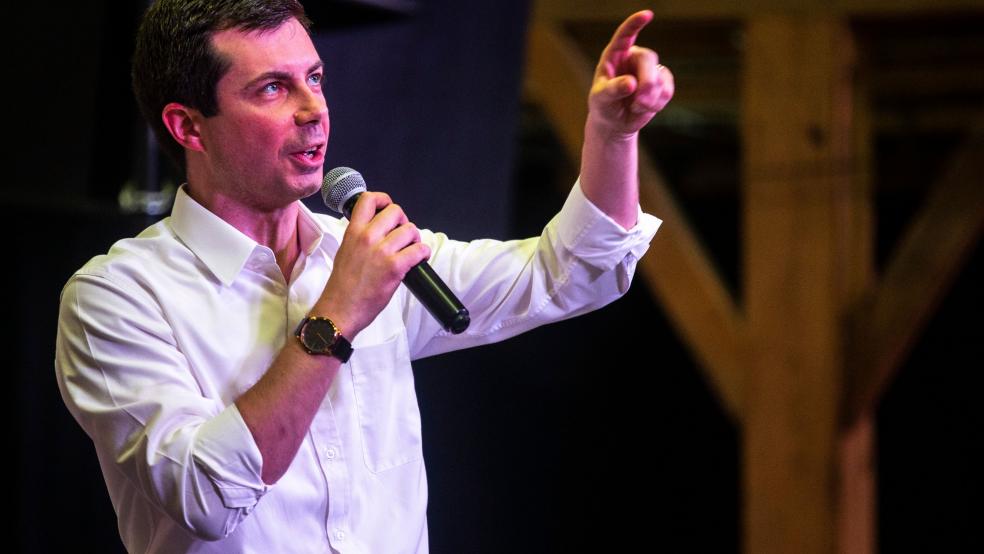Pete Buttigieg has sparked a strong backlash from the left by suggesting that Democrats should take a firm stand on the importance of the national debt.
For months now, Buttigieg has urged Democrats to embrace debt and deficit concerns. "I think the time has come for my party to get a lot more comfortable owning this issue,” Buttigieg said in New Hampshire over the weekend, ahead of a strong second place finish in the state’s primary. “Because I see what's happening under this president — a $1 trillion deficit — and his allies in Congress do not care. So we have to do something about it.”
Buttigieg also has urged progressives in his party to focus on the issue even as they seek to enact a bold policy agenda. “It’s not fashionable in progressive circles to talk too much about the debt, largely because of the irritation to the way it’s been used as an excuse against investment,” he said. “But if we’re spending more and more on debt service now, it makes it harder to invest in infrastructure and health and safety net that we need right now.”
The emphasis on the debt may be a way to differentiate himself from Sen. Bernie Sanders, the Democratic frontrunner and Buttigieg’s main rival in Iowa and New Hampshire voting — and it could be his way of laying claim to President Obama’s centrist fiscal approach.
“Mayor Pete’s just showing how far he’s willing to go to out-centrist the rest with his deficit comments,” blogger Allahpundit suggested at conservative site Hot Air. “And of course, by insisting on fiscal responsibility, he’s underlining the blowout deficits that Bernie Sanders’s agenda would saddle America with.”
Buttigieg is the only candidate among leading Democratic contenders to have fully offset the cost of his agenda, according to a recent study by the centrist Progressive Policy Institute (the study didn’t look at Sen. Amy Klobuchar’s proposals).
The political question, though, is to what extent his emphasis on the debt will really resonate with a Democratic electorate eager to push through a progressive agenda, or with voters who believe — with ample evidence to back them up — that the mantra of “fiscal responsibility” has simply been a tool employed by hypocritical Republicans to prevent the enactment of Democratic priorities.
The pushback from some on the left to Buttigieg’s embrace of debt and deficit concerns has been forceful, even harsh.
- At The American Prospect, which labels Buttigieg “Austerity Pete,” Alexander Sammon writes: “Buttigieg’s sudden pivot to deficit-hawk politics is deeply misguided and evinces a profound misunderstanding of recent political and economic history. Virtually all of the party’s disparate factions understand that there simply isn’t a deficit problem worth obsessing over at this time, and making such noises only serves to restrict progressive ambitions. That Buttigieg is taking his cues from the worst minds in politics when it comes to the federal budget only heightens his wrongheadedness.”
- Over at New York, Eric Levitz offers a lengthy and detailed takedown, slamming both Buttigieg and the Beltway orthodoxy surrounding the idea of fiscal responsibility: “It is now clear that the United States could have easily afforded to run higher deficits than it did during the Obama years. Which means that our political leaders subjected the American people to years of unnecessary economic hardship for no good reason, while the Democratic Party needlessly preserved $1.5 trillion in fiscal space (that could have been used to accelerate clean-energy development or eradicate child poverty) for Obama’s Republican successor to fill with giveaways to the rich.
“Any politician who does not understand that this is the true lesson of Trump’s deficits — or else, who pretends not to understand in deference to popular prejudice — has no business being our next president.”
But while Buttigieg’s rhetoric has opened him up to such attacks from the left that he hasn’t grasped — or has alarmingly chosen to ignore — the fiscal lessons of the past decade, his actual proposals represent a much different approach than deficit hawks favored as recently as several years ago. As Jordan Weissmann reports at Slate:
“Pete Buttigieg is not much of a deficit hawk. But he does play one on the stump. … Traditionally, centrist fiscal hawks tend to argue that Washington needs to raise taxes and rein in entitlement spending just to make our current suite of federal programs sustainable. Buttigieg, in contrast, mostly just talks about raising taxes, primarily to pay for new spending.”
Buttigieg wants to expand Social Security benefits and government health care programs. And a Buttigieg spokesperson, in answering questions from Weissmann, clarified that the candidate’s approach would be quite different than President Obama’s:
“Pete would not support Bowles-Simpson or any type of agreement that would lead to any cuts to Social Security or a ‘Grand Bargain’ that would lead to irresponsible cuts to critical programs. Instead, Pete’s proposed a bold, progressive agenda, including expanding Social Security Benefits, and he’s outlined sources of revenue that would fully pay for his agenda that include higher taxes on corporations and the top 2%.”
Weissman nevertheless argues that, while the candidate might be looking to score political points against Sanders and Trump, Buttigieg “is breathing life back into the discredited ideology of austerity” and likely doing “much more harm than good for the progressive cause.”





